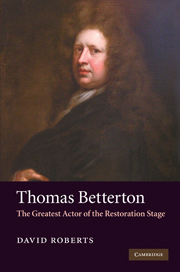Book contents
- Frontmatter
- Dedication
- Contents
- List of illustrations
- Acknowledgements
- Note on dates and texts
- Chapter 1 Introduction
- Chapter 2 Look, my lord, it comes
- Chapter 3 An obstinately shadowy Titan
- Chapter 4 An actor of London: early years, 1635–1659
- Chapter 5 A walk in the park
- Chapter 6 In the Duke’s Company, 1660–1663
- Chapter 7 Equal with the highest
- Chapter 8 Actor management
- Chapter 9 In the Company of the Duke
- Chapter 10 Union
- Chapter 11 Back to the future
- Chapter 12 Books and pictures
- Notes
- Bibliography
- Index
Chapter 9 - In the Company of the Duke
Betterton and Catholic politics in the 1670s
Published online by Cambridge University Press: 05 July 2014
- Frontmatter
- Dedication
- Contents
- List of illustrations
- Acknowledgements
- Note on dates and texts
- Chapter 1 Introduction
- Chapter 2 Look, my lord, it comes
- Chapter 3 An obstinately shadowy Titan
- Chapter 4 An actor of London: early years, 1635–1659
- Chapter 5 A walk in the park
- Chapter 6 In the Duke’s Company, 1660–1663
- Chapter 7 Equal with the highest
- Chapter 8 Actor management
- Chapter 9 In the Company of the Duke
- Chapter 10 Union
- Chapter 11 Back to the future
- Chapter 12 Books and pictures
- Notes
- Bibliography
- Index
Summary
The issue came to a head on two afternoons in February 1680 that temporarily closed the Dorset Garden theatre. Audiences were already plummeting and censorship increasing when ‘drunken people’ crashed the auditorium mid-performance, creating ‘abominable disorders’, calling ‘all the women whores and the men rogues’ and its ducal patron a ‘rascal’. As so often, the king’s French Catholic mistress, the Duchess of Portsmouth, was the subject of ‘several reproachfull speeches’. Lanterns and candles were thrown at the actors and by royal order the theatre went dark for a fortnight. Betterton had reason to feel worried but also slightly aggrieved. Throughout the 1670s the company had squared commercial well-being with the Duke’s convictions, which had long been public knowledge; at the same time, it had recently sought to capitalise on the intense public feeling that characterised the Popish Plot crisis by mounting anti-Catholic shows. If February 1680 posed a stern choice between loyalty and box-office success, it also suggested that where his patron’s religion was concerned, Betterton’s long mature instinct for both might be confounded.
The question of the Duke was one Betterton had had a long time to ponder. As early as 18 February 1661 Pepys had worried about ‘a professed friend to the Catholiques’ ascending the throne. Never the ‘leader of the Catholic community in England’, James did not convert formally until 1669, although he had always employed an unusual number of Catholics. Come his exclusion from public office by the 1673 Test Act, followed by his renunciation in 1676 of all Anglican services, lines of political demarcation were firm enough for him to have acquired a reputation as ‘a man for arbitrary power’, ‘heady, violent and bloody’. Such qualities might make him an inspiration for drama but they did little for his profile as a patron.
- Type
- Chapter
- Information
- Thomas BettertonThe Greatest Actor of the Restoration Stage, pp. 120 - 136Publisher: Cambridge University PressPrint publication year: 2010



